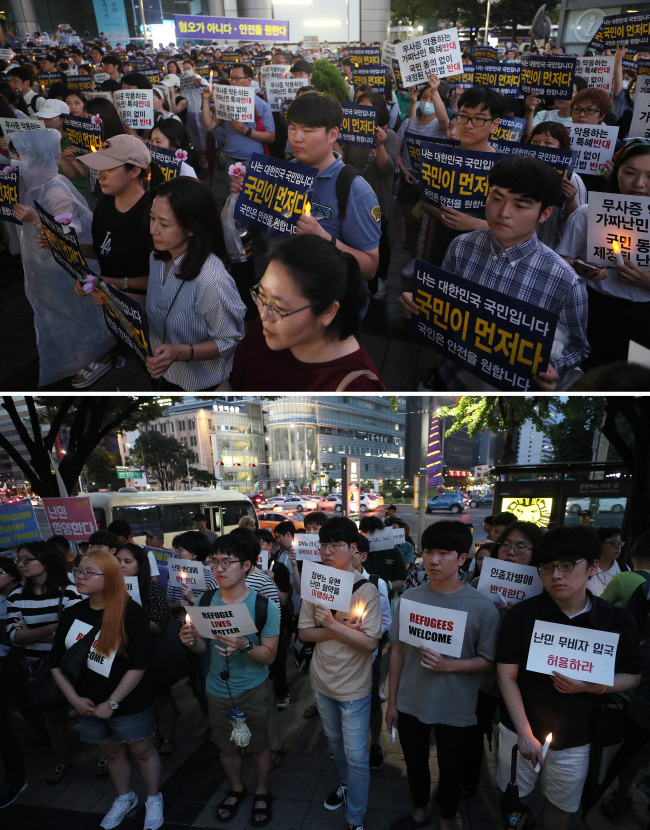Lawmakers divided on direction of refugee law revision
By Jo He-rimPublished : July 2, 2018 - 18:17
South Korean lawmakers appear to be divided on the issue of asylum seekers in the country. While some voice the importance of protecting the refugee applicants for humanitarian reasons, others are calling for stronger measures for “fake” refugees.
On Sunday, first-term lawmaker Rep. Kwon Chil-seung of the ruling Democratic Party of Korea, along with nine others, proposed a law revision plan that mandates stricter screening process for refugee applicants.
On Sunday, first-term lawmaker Rep. Kwon Chil-seung of the ruling Democratic Party of Korea, along with nine others, proposed a law revision plan that mandates stricter screening process for refugee applicants.

“While the South Korean government has to carry out its international responsibility, it also has to come up with measures to dispel rising worries among Koreans,” the proposal stated.
“It is crucial that the country strictly inspects the applicants to sort out ‘real refugees’ to offer help to the right people and also reduce public prejudice against them.”
Kwon’s revision plan seeks to give the Justice Ministry the power to refuse applications from those deemed harmful to society. The revision plan also states that the ministry can discard applications resubmitted by those who were previously rejected.
Kwon’s party, however, does not have a unified view on the matter.
“The refugee issue is not the problem of other nations, but it can also be ours. The government should provide firm principles on humanitarian aid for the asylum seekers,” two-term lawmaker Rep. Jin Sun-mee said in a party meeting last month.
In a statement, a four-term lawmaker Rep. Cho Kyoung-tae of the main opposition Liberty Korea Party said a conflict is unavoidable, if the country maintains its asylum program for “clumsy paternalism.”
The law revision proposals that are pending at the National Assembly also show differing attitudes. There are currently five amendment plans proposed by lawmakers across the aisle, including the one proposed Sunday. The four others, proposed in 2016, seek to enhance the rights of refugees and asylum seekers, saying the country needs to step up efforts as an “advanced” country in refugee protection policies.
A revision plan presented by Rep. Hong Il-pyo of the main opposition Liberty Korea Party, for example, intends to provide translation service of languages other than Korean and English, during the application procedures for asylum seekers. A proposal by Rep. Hong Ihk-pyo of the ruling Democratic Party demands the government to provide subsidies to asylum seekers who failed to obtain refugee status but were given humanitarian stay permits. Those with humanitarian stay permits currently do not receive the financial aid that refugees get, and are given job permits.
The divided opinion among lawmakers seems to have been influenced by the rise of public sentiment against asylum seekers.
In central Seoul on Saturday, two rallies were held. A group of protesters -- People’s Solidarity Against Illegal Asylum Seekers -- staged a protest in Gwanghwamun Square, demanding the government to come up with measures to fend off “fake refugees” who will take advantage of the asylum system for economic gains. On the other side of the area, supporters of asylum seekers also held a rally, calling for more tolerance towards the people for humanitarian reasons.
South Korea signed the 1951 UN Refugee Convention in 1992, and boasts being the first in Asia to enact its own Refugee Act, which came into effect in 2013. But it was about a decade after joining the refugee convention that the country accepted its first refugee in 2001. The refugee acceptance rate falls far behind the average of other signatories to the convention.
According to the Ministry of Justice last month, 839 refugee statuses have been granted since the system was first introduced in 1994, representing 4.1 percent of the total of 20,361 cases that had completed review. The average acceptance rate of other member states to the refugee convention is 38 percent.
By Jo He-rim (herim@heraldcorp.com)



















![[Today’s K-pop] Treasure to publish magazine for debut anniversary](http://res.heraldm.com/phpwas/restmb_idxmake.php?idx=642&simg=/content/image/2024/07/26/20240726050551_0.jpg&u=)